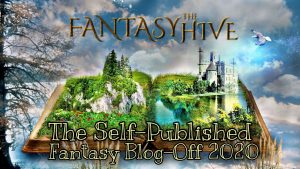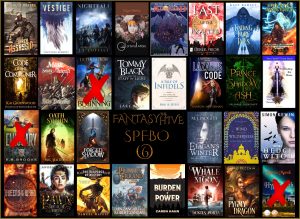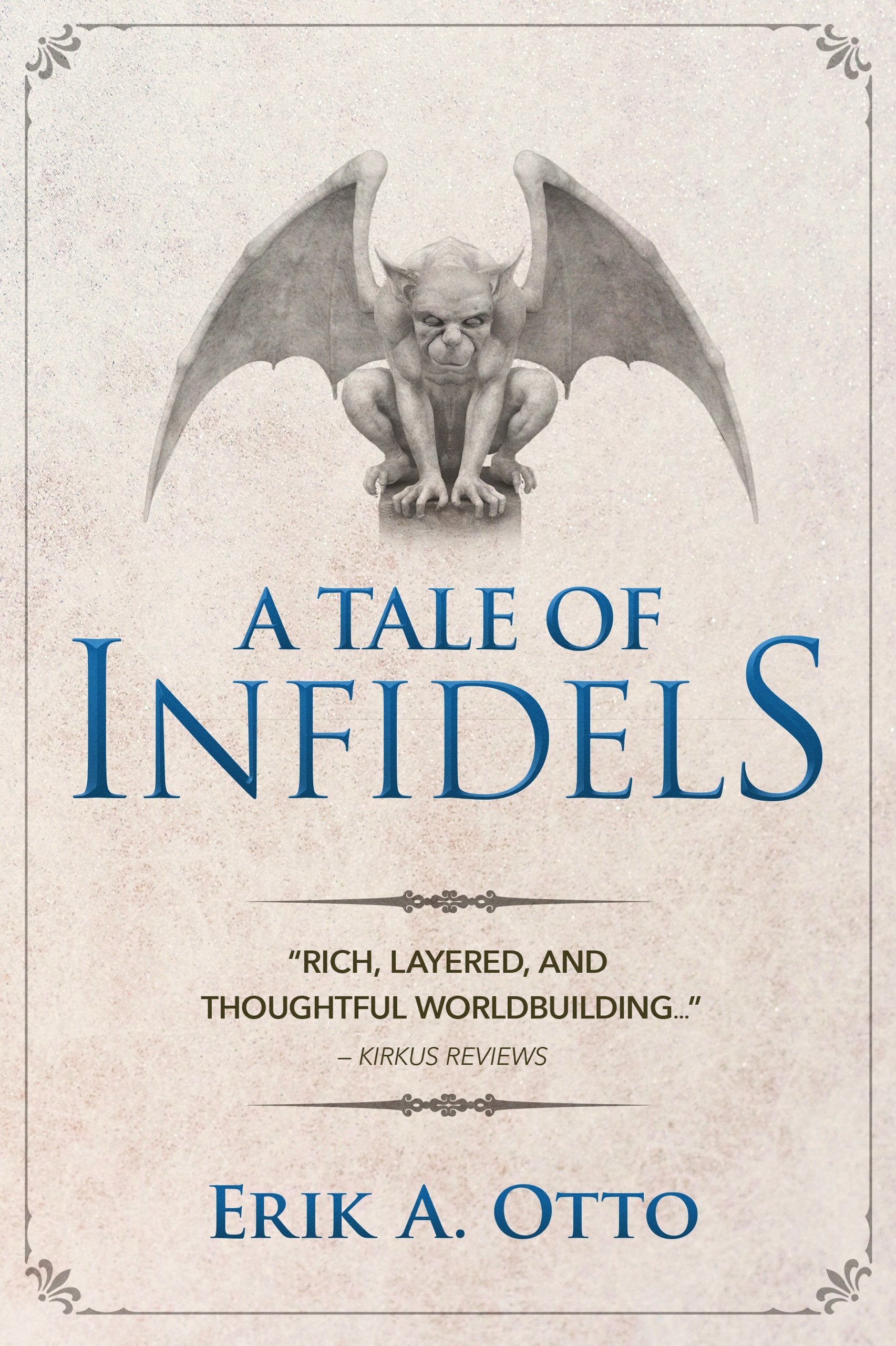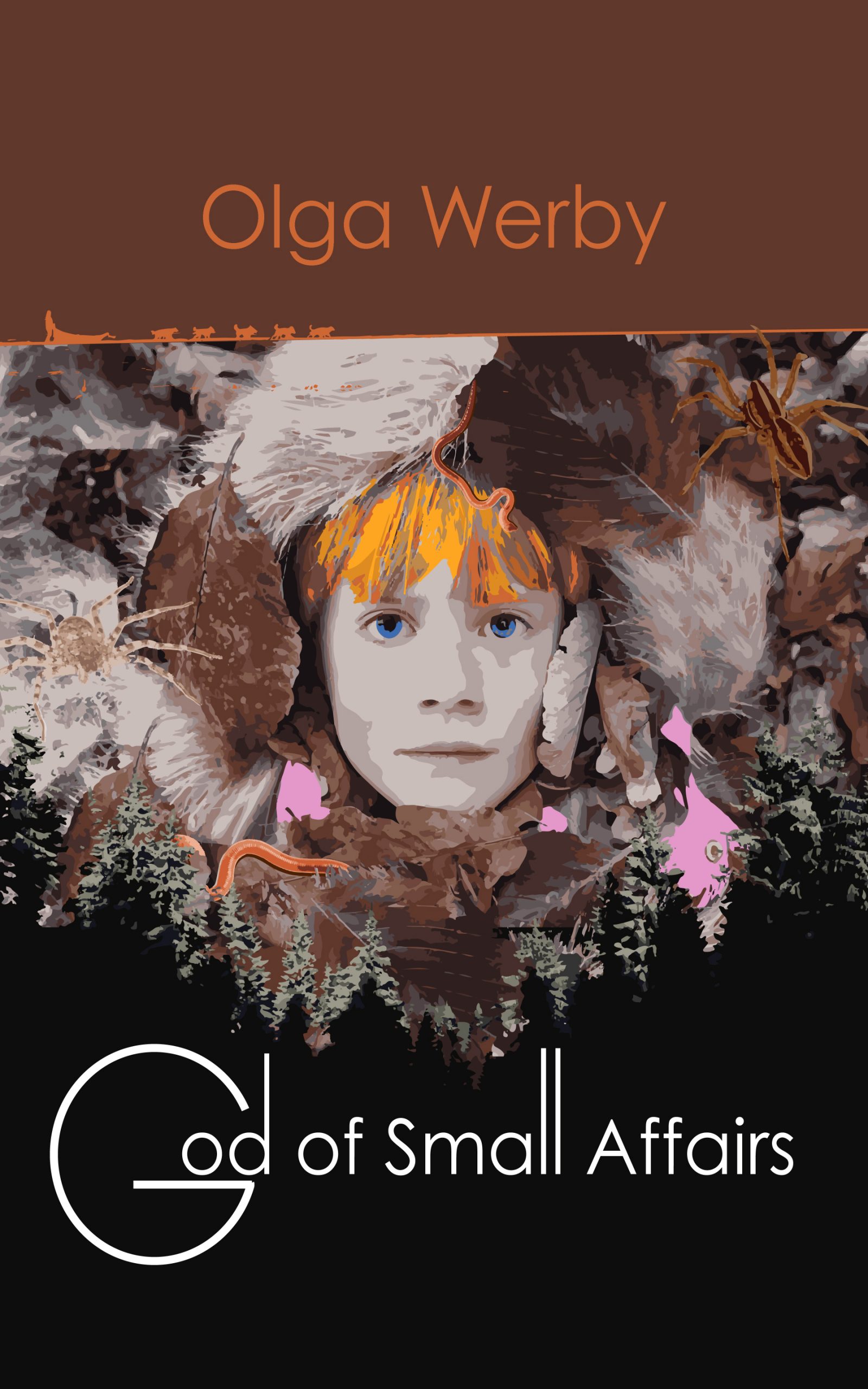SPFBO 6: Eliminations Part One
The sixth Self-Published Fantasy Blog-Off (SPFBO) is already well underway!
Check out our introduction here, meet this year’s judges gere here, read all about the contest’s origins here, and keep track of phase one here!
This year, we’re arranging our eliminations a little differently.
Every week, we’ll be announcing a batch of five books. Three will be eliminated on the Wednesday, carrying two forward to the Friday, when we’ll announce a semi-finalist.
Continue reading for the Fantasy Hive’s first three eliminations…

As you know, the 300 competing titles have now been split into batches of 30 and assigned to one of the ten participating blogs. But we can’t keep them all, as each blog begins to eliminate unlucky entries in the search for their finalist.
As we mentioned in the introduction post, the best thing about participating in SPFBO as part of a team rather than as an individual is that round one ends up being about as fair as it can be. As the contest progresses you’ll hear us continually stress that much of what gets said is completely subjective. Aside from issues with (e.g.) spelling or grammar, which are more or less indisputable, the bloggers’ opinions are exactly that: opinions. So when there are five pairs of eyes potentially reading the opening chapters of every single book entered, chances are we’ll be able to give a more rounded view of each one, and to choose our finalist according to how many of us it managed to strike the right chord with.
So, without further preamble, here are our first three eliminations, followed by the announcement of this week’s Quarter-finalists from which we will be choosing our first semi-finalist in our Friday post.
ELIMINATION #1
A New Beginning
J E Thompson
Vexx White is a down on his luck apprentice mage, recently expelled from Fallanden Magical Academy for experimenting with necromancy. With nothing to lose, he becomes a dungeoneer for hire—taking odd jobs in his home town of Cloudbury for pocket change. Nine out of ten dungeoneers die in their first ten quests, and to survive Vexx finds himself teaming up with a clumsy elf and a crazed succubus. When they’re not busy trying to kill each other, the dungeoneers drum up all the work they can get, from raiding dungeons to hunting down thieves.
Vexx’s adventures take him from the seedier parts of Cloudbury to the goblin-infested Lifeless Hills in search of gold and glory. But if he wants to live up to his hero, the legendary dungeoneer Dred Wyrm, what other choice is there?
Theo’s thoughts:
The story follows Vexx White, expelled student sorcerer returning home to find his father dead and impulsively launching on a career as an adventurer with a clumsy, naive and scantily armoured female elf named Kaylin as his partner. The story strives for a kind of slapstick humour, the inversion of tropes with the clumsy stupid elf, and the anti-heroic bombast of Vexx waiting to be punctured by misjudgement or failure. It reads as though a DnD or WoW campaign had been “novelised,” complete with humorous backstories and a barkeep who hands out quests that can be cashed in. I could almost see the yellow exclamation mark above the barman’s head. The chapters are short, helping to make it a fairly quick and easy read, and while there is a fair proportion of exposition (and some irritating italicised internal reflections by Vexx) the story does rattle along.
But it didn’t grab me for a number of reasons. The male gaze on the elf with phrases like “skimpy armour leaving very little to the imagination” and later on “skintight underclothes leaving little to the imagination” might possibly have been intended as tongue in cheek – an attempt to subvert a trope by over-exposing it (sorry about the inadvertent pun), but if so it fell flat for me. Similarly Vexx’s indignation at being mistaken for a healer “I’m a healer because my last name is White? That’s borderline racist” just jarred badly for me. This may function as a novelisation of a couple of mismatched low level characters with flawed backstories getting together and (though I hesitate to forecast) going through several quests that help them improve skills, gain experience and come to a better appreciation of each other. However, the writing didn’t lift it far enough above its roots of game play, cliche, and male gaze for me to be keen enough to read on.
Nils’ thoughts:
The cover art design looks of high quality and it definitely worked to grab my interest. The sorcerer, elf and possible winged demon in the background fighting off a few skeletons gives the impression of a magic-fuelled, dark mysterious story.
At first I was quite excited at the prospect of the main character having a villainous side to him, it felt quite unique. However, when I started reading I quickly realised that this book wasn’t going to be as dark or as in depth as I’d hoped for. Just in the opening chapter we see that Vexx is a shallow and a rather irritating character; I took an immediate dislike to him, and the way the story in general was written. For example when discovering his father had passed away, Vexx shows no other emotion other than ‘moist eyes’ which is quickly followed by shallow snarky humour. This is where my main dislike lay – the humour just did not work for me at all and the dialogue felt forced and clunky.
Then there was the stereotypical and rather sexist description of the Elf whom Vexx meets at a bar. She’s described as wearing very little except for ‘tight leather armour’ and her ‘long shapely legs bore no protection whatsoever’. This made me roll my eyes so much I had to put the book down.
Beth’s thoughts:
I wasn’t a big fan of the cover, but that’s just down to my own cover preferences and the fact that I don’t generally like seeing depictions of characters before I’ve had a chance to ‘meet’ them.
I found the style quite easy to read, and I was interested in the plight of this character excluded from the Academy – I found the returning joke of his bitterness regarding the exclusion really quite humorous. However, I think this was the only part of the humour that I did get on with. I really disliked the treatment of the elf character. I think had it been balanced right, her character could have been funny, however much of the time it just made me feel uncomfortable; particularly that, despite how stupid and useless the protagonist thought her, he still lusted after her. Ultimately, I just didn’t want to see where that would end up. The humour, on the most part, was just too grating, the protagonist just a little too annoying; it lacked the subtlety to really pull it off.
Filip’s thoughts:
A New Beginning has an extremely well-drawn cover that looks almost like a piece of promotional art for a video game; eye-catching enough to intrigue me about the contents inside. The opening chapter was engaging, with well-written prose underlined with a nice amount of humour. I enjoyed it well enough, and though it wasn’t anything groundbreaking, I thought it might be a pleasant pastime. Alas, Thompson’s novel takes a plunge from that point on.
For a moment there, this seemed intent on parodying the more sexist elements of fantasy, as well as the formulaic opening to your typical D&D campaign. Unfortunate, then, that A New Beginning embraces the very components of the trite fantasy DNA I thought it might be attempting to satirize. The novel lacks a unified voice — if the author meant to take the piss out of the sexism so inherent in a certain subset of fantasy novels, he fails miserably, at least in these first twenty percent of A New Beginning.
Julia’s thoughts:
I really didn’t get far with this one. Mostly it was the tone and voice of the book that just didn’t grab me at all, but instead repelled my interest early on. Combined with a main character who I dislike immensely after even just 15% of the book, I just didn’t find anything that grabbed me enough to keep me going, even though I was really hopeful about this one, as I do like the tropes that the cover seemed to promise…
ELIMINATION #2
Hyperearth
Marco Marek
In the castle of city of Lubena, Mary and Martina found a portal to another dimension called Hyperearth. This will be the beginning of various adventures of this two teenager girls, fighting the evil Sathon but also make new friendship and curious discovers.
Theo’s thoughts:
This is a kind of portal/parallel world fantasy that I suppose has a sort of C.S.Lewis and Narnia association. The teenaged girls Mary and Martina go through a slightly convoluted process to get to Hyperearth – a place full of nice people and a wizard called Sathon who some might call evil, though the girls’ guide instead describes him as cheeky. This was one of several word choices (an “abysmal” cliff?) along with some grammatical curiosities which made me think perhaps the author was not a native writer in English.
While parallel worlds offer a rich opportunity for adventure, the plight of the characters, the world building and the prose just didn’t lift the story enough. There was too much mundane detail in the descriptions and the dialogue. The peril arrived frequently but without any real sense of threat, as it dissipated too quickly. Similarly magic items and creatures were too easily flicked into existence at a click of the author’s fingertips such that the whole thing felt like a sequence of ideas more than a coherent story. I didn’t find any obvious typos, but the prose felt at best functional rather than flowing, which contributed to Hyperearth being something of a miss for me. I read as far as 21% but this didn’t really fire my enthusiasm enough for me to want to read on.
Nils’ thoughts:
I wasn’t keen on the cover for this one, it failed to catch my eye at all. I agree with Theo, the prose is extremely simplistic and childlike even for a YA. The dialogue is cliched, repetitive, and mostly used for exposition. There is absolutely no showing, the author just tells us everything. The two protagonists are supposed to be sixteen, yet they come across as no older than five. Children’s literature, and even YA literature can and should include depth, complexities, and should not prejudge their audience as not having the capability to understand. They understand a lot more than you think.
Having said that, the concept of Hyperearth – basically an alternative Earth, really was intriguing and I hoped for its mystery to be thrilling and somewhat creepy – sort of like a world represented in Coraline by Neil Gaiman. However it turned out to be quite disappointing.
Beth’s thoughts:
I didn’t think this was a particularly strong cover, it didn’t grab my attention or make a good first impression. The book features a map, and at first glance it looks great; but when you actually look closer for reference, it’s very confusing and almost looks like it’s been created from bits of other maps spliced together.
The writing style is very simplistic, like the cover there was little to grab my attention;
“Her house was pleasant, made of wood that contrasted the white of the snow outdoors.”
We’re introduced quite quickly to the two characters of Martina and Mary, but they are so lacking in description and personality that I couldn’t tell the difference between them. The plot is quite fast, for example by the third page they’d been to the castle and headed home again, “delighted to have had an adventure that evening.” There was very little substance. I felt like perhaps the narrative was deliberately simple because the characters are young, but just because they’re young doesn’t mean they can’t have personalities. Rich prose and deep characters should not be the domain of “adult” fiction, just think of children’s authors such as C. S. Lewis, Diana Wynne Jones… There was not enough depth to this narrative to encourage me to continue reading.
Filip’s thoughts:
Ah, the dreaded Hyperearth. Is this one of those cases when something is so bad that it turns out good? …No, I think not. This is baby’s first fantasy novel, and it shows. It’s not that this book only lacks eloquence; functional prose is all good and fine, but I lacks in that, also. The dialogue is stilted and beyond, offering the kind of exchanges between characters that you will find in a Bulgarian second-grader’s English textbook:
“Hello, Martina; how are you?” Mary asked.
“I’m good, and you?” Martina replied.
“Well, I love when it snows!” Mary said happily.
And it goes on, and on. I still have nightmares about such exchanges.
Tenses change in questionable ways: “Martina felt euphoric, but she doesn’t know that her wish would soon become a reality.” Descriptions lack any sort of elegance or subtlety, and when you mix them with the reactions of the characters, they create some unintentionally hilarious scenes:
As Martina neared the water, she saw the image of a man reflected in it. It oscillated between being bald and other times with a beard and hair. Grinding his teeth, he said, “Welcome, or miswelcome, to Hyperearth,” followed by a sinister laugh. As the image of his face moved closer and closer to the girls, they cowered in fear.
Suddenly, a massive cascade of water covered the two girls, soaking them. A few fish squirmed on the ground in the puddle of water that was left. Martina sighed. “What a shock, but I’m better now,” she assured.
Compelling, innit?
Characters do not speak often. They “exclaim,” “lament,” and “instruct,” they “comment” and “begin,” or “assure” as above, but rarely do they “say” anything. Speech tags are a contentious issue among some readers, but the sheer amount of them here is a constant distraction.
It’s rare that you come across a book that is so objectively bad, but I simply see nothing which could appeal to even the most hardcore fan of parallel world fantasy.
Julia’s thoughts:
This one was an even earlier DNF for me. The prose is extremely simplistic, and felt like a badly written Enid Blyton novel to me. Not even YA, but more like a very easy middle grade book. Dialogue and prose both felt stilted and wooden and just didn’t work at all for me, and constant repetition made it even worse. Like the name Martina being used 9 times just on page one on my ereader.
ELIMINATION #3
Emissary
E. B. Brooks
Ewan O’Meara dreams of becoming the greatest adventurer Veridor has ever known. Problem is, there haven’t been any epic quests since the ancient war of independence. His parents keep badgering him to take a respectable profession, and the overbearing Church soaks him for penance gold every time he dies.
When he encounters a young woman fleeing arrest, he can’t resist helping her. At first glance, Treanna Rothchild needs it: she’s clueless about Veridian life. But she has other skills that defy Ewan’s understanding, and she knows things. Unsettling, seditious things the Church wants kept secret at any cost.
And she’s here to raise an army.
Risking both life and soul, Ewan follows Treanna where no Veridian has been, but he must come to terms with the harsh world she reveals as he discovers how much they have in common—and how much they depend on each other to survive.
Theo’s thoughts:
I sort of guessed this was a litRPG novel before the italicised command lines and other giveaways came up. It appealed to me more than the last SPFBO LitRPG I read, in that it seems to have a sense of story and character, although the game mechanics are coming in quite heavily. I get a slight vibe of Tron mixed with Matrix, mixed with World of Warcraft, mixed with ToyStory – in the sense that do the toys/players know they are toys/players. Do they know that where they are is not real? Will they succeed both in the virtual quest and in realising their link to an “outside” world? So yes, plot wise it snagged my curiosity. The prose didn’t set me afire though, and there’s a bit of male gaze that might be in character for a teenage boy, but still… “hair like a pool of honey” a bit of a sticky one for me there. So it was a “maybe” for me. I wouldn’t mind reading on, but I wasn’t sufficiently invested yet. In the end there were too many other entries that made a stronger call on my attention.
Nils’ thoughts:
I think for the genre of the book – LitRPG, the cover works really well. It did actually look to me as though it could be a cover of a video game. It’s not necessarily the kind of cover that appeals to me, but it is of high quality.
Unfortunately I very much struggled with this one. I found there was repetitive use of pronouns, which by the end of the first chapter grated on me a lot. I wasn’t fond of the made up swearing, for example ‘frapping’ and ‘goobers’. I think Julia said that one of these is a trait in the LitRPG genre, and as I’m fairly new to the genre this is my ignorance coming into play, yet it irritated me nonetheless.
The actual narrative didn’t particularly excite me to read on, and the dialogue also felt rather cliched and bland.
Beth’s thoughts:
The cover looks professional and the artwork is of excellent quality, but judging by the cover I probably wouldn’t pick this one up ordinarily. I like the thought that maybe there’s a dual world/portal world thing going on, but the hints of that kind of urban fantasy with modern guns, tech, and ‘ops’ isn’t really my thing.
The opening of the prologue is nicely atmospheric. It starts with a nice feeling of tension, but unfortunately this becomes muted somewhat through the heavy exposition delivered through memory and dialogue. The remembrances are particularly frustrating as the protagonist stalks towards his prey, I found it quite distracting.
Unfortunately, any promise I felt in the prologue dipped somewhat in the first chapter. The tone changes a great deal and there are a number of Americanisms, fake swears, and we’re even treated to a feisty red-head cliche. I had a sense that the fact the protagonist can respawn after he dies was supposed to be a shock ending to the chapter; but the ease with which they dispatched everything throughout the chapter, and their talk of collecting ore, and something about some kind of limitless pack, all gave the game away somewhat. No pun intended. I don’t think the end of the chapter achieved the resonance the author was perhaps going for.
The writing style is very simplistic: “When he woke, the sun’s rays were poking his face.”
I’m still getting used to LitRPG as a genre, and had thought protagonists were players; so I’m trying to get used to this idea of protagonists as in-game characters telling their stories? I’m still trying to work out who these characters are, how did they get there, do they know they’re in a game; and this confusion and unfamiliarity made it difficult for me to focus on the story. I found myself unable to connect to the characters or their story, so wasn’t interested in reading on unfortunately.
Filip’s thoughts:
Excellent cover, quite a lot of promise there. The lower half gave me an “Attack on Titan” vibe, but that’s by way of association.
This is a litRPG novel with all the issues inherent of litRPG novels and none of the interesting genre conventions; what troubles me is that the litRPG elements are internalised with no explanation, at least in the several chapters I read of this.
The dialogue was heavy on clichés–especially in the prologue–and a little repetitive. I’m sorry to say, The Emissary simply failed to enchant me. I came away from it with no strong impressions, which is a pity, as the few other litRPGs I’ve read, novels such as The Occultist and God of Gnomes immediately clicked with me.
Julia’s thoughts:
My first impression of this one was: overuse of names! Maximilian here, Maximilian there, Maximilian everywhere! That problem got better in the next chapter, but it was really annoying right at the beginning.
The actual first chapter was a lot better than the prologue which felt wooden and artificial, but still felt a bit rough around the corners prose wise. Especially the dialogues could have been a lot smoother.
I didn’t think it was bad, and I could have finished this very easy LitRPG as a breather between the big complex tomes. The tone and voice had a distinct YA feeling to me though, especially in the made up curses and the way our main character reacts to girls, so it won’t be for everyone.
This week’s Quarter Finalists are:
Commiserations to our first batch of eliminated books, and congratulations to our quarter-finalists!




[…] case you missed them, here are our first, second, third, fourth, fifth and sixth lot of group […]
I have been wondering if outright bad SPF books made it into the slush pile or if instead there was some sort of natural filter that prevented them from being submitted in the first place. Your reviews of Hyperearth suggest to me that it’s the former.